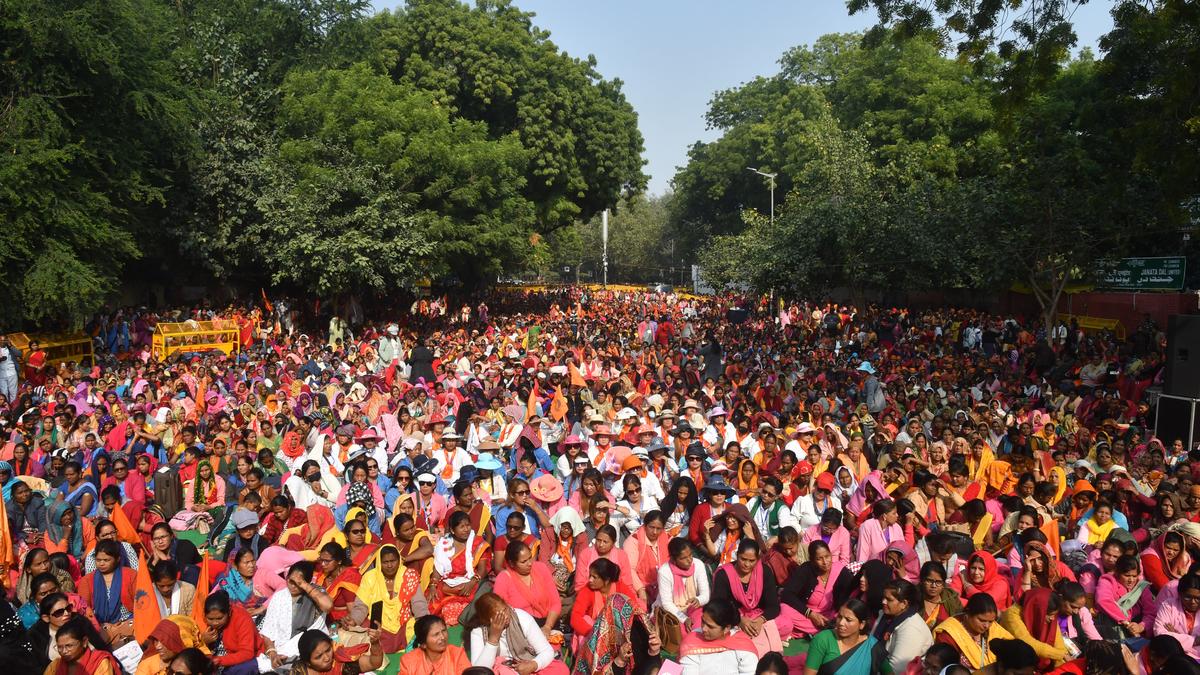Anganwadi workers at a protest in Delhi demanding better pay.
| Photo Credit: file photo
“Humein muft ke paise nahi chahiye, apne haq ke paise chahiye (we don’t want charity, we want money that we deserve),” says Sangeeta Mishra, 45, an anganwadi worker in north-east Delhi’s Sonia Vihar, at the end of her eight-hour shift.
Ms. Mishra refers to the monthly financial aid promised by the three major political parties — Aam Aadmi Party (₹2,100), Congress (₹2,500), and Bharatiya Janata Party (₹2,500) ahead of the Assembly election — and terms them “mere lip service”.
She earns much less than the minimum wage for unskilled labour (₹18,066) and says her meagre income and the increasing cost of living will be on her mind when she casts her ballot on February 5.
Anju Sharma, 52, an ASHA, also expresses reservations over the monthly cash promises. “We were at the forefront during COVID-19, during which we took many risks. Still, I am able to make only ₹7,000-8,000 a month. Parties are promising money to women, but it would have been better if we were paid a decent salary to begin with,” she says.
Over the past few years, ASHA (Accredited Social Health Activist) and anganwadi workers, who form the backbone of the country’s fight against infectious diseases and provide door-to-door maternal and child healthcare services, have held several protests in the national capital demanding better pay.
Many anganwadi workers The Hindu spoke to said that despite being on the frontlines of the nation’s fight against the pandemic, they are still considered “volunteers” instead of “employees”.
On Thursday, the ASHA Workers’ and Facilitators’ Federation of India wrote to Union Health Minister J.P. Nadda, seeking recognition as formal employees with statutory rights.
Eligibility norms
While promising the monthly aid of ₹2,100 through the Mahila Samman Yojana, AAP excluded government employees from the ambit of the proposed scheme.
Several anganwadi workers said they are apprehensive about their eligibility for the scheme because, while they work for the government, they are not officially recognised as employees.
Savita Rawat, an anganwadi helper and widow, is one of them. She receives a monthly pension of ₹2,500 through the Delhi Pension Scheme for Women in Distress.
Ms. Rawat says that her workload has increased over the past few years, particularly since it became mandatory for ASHA and anganwadi workers to record daily activities on the Poshan Tracker mobile app, on which they sometimes face technical glitches.
Anganwadi workers earn an honorarium of ₹12,720 every month, whereas the helpers receive ₹6,810 a month. ASHAs earn a monthly stipend of ₹3,000 and additional amounts for completing specific tasks, which can add up to ₹7,000-8,000.
Published – January 31, 2025 01:35 am IST
